
Everyone checks whether the gas is off sometimes or tidies up clothes very neatly. Maybe you have the same song in your head all day long or you may, for example, only walk on the white paving stones. Only when you spend hours folding your clothes or check ten times whether the door is properly closed does it become compulsive.
Do I have Obsessive Compulsive Disorder (OCD)?
We all have our established habits and routines for which there is no apparent need. For example, you can think of only being able to go to work when your desk is tidy or something nasty that is said to “knock” on wood. We all know these examples and it is something that does not bother us and which just belongs to us a bit. Obsessive compulsive disorder (OCD) is a different story: your life is dominated by compulsions (obsessions) and compulsions. Concrete examples of this are:
Obsessive thought: “I have been infected with a serious illness through contact with urine”
Compulsion: washing hands often, cleaning
Compulsive thought: “everything has to be precise”
Compulsion: put everything right, count
Compulsive thought: “I am doing something wrong or dangerous” (eg leaving gas open)
Compulsion: repeated monitoring
How do I get rid of my Obsessive Compulsive Disorder (OCD)?
The combination of medication and cognitive behavioral therapy (CBT) leads to the best results in the treatment of OCD. CBT firstly looks at your mistakes in the thinking process, such as errors in perception, wrong conclusions, black / white thinking, etc. You are challenged to examine your ideas in practice for credibility / reality (e.g. how realistic is that you get a serious illness from contact with urine). The second element that you pay attention to during CBT is response prevention of the compulsive behavior (= not performing the compulsions) and in addition exposure in vivo (= “undergoing” the fear-inducing situation).